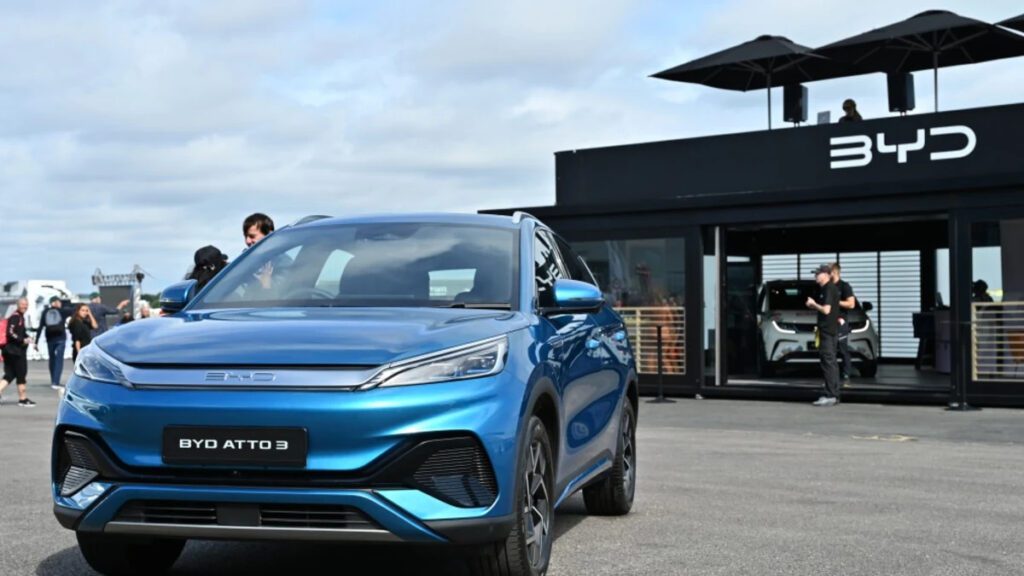Chinese EVs lose ground in Europe as tariffs take effect

BYD at the British Motor Show this week in Farnborough. (Getty Images)
European Union tariffs slowed the influx of Chinese-made electric vehicles in July, as the bloc moved to protect its automakers from low-cost competition.
The number of new EVs that Chinese automakers like BYD Co. and SAIC Motor Corp.’s MG registered in the EU last month fell 45% from June, according to research from Dataforce, which compiled results across the 16 member countries that have reported July figures to date.
The drop may have been exaggerated by carmakers rushing to get EVs to dealers before the added levies took effect July 5.
“We saw a huge push from Chinese manufacturers” to empty stockpiles in June, said Matthias Schmidt, an independent auto analyst based near Hamburg. “That likely caused an inventory burn.”
The provisional tariffs, which raise import duties to as high as 48%, are meant to shield an important EU industry from Chinese rivals that enjoy structural advantages in key areas such as battery technology that have benefited from state subsidies. Political tensions remain high, with Beijing threatening to retaliate amid talks to resolve the matter.
Overall, Chinese brands weren’t massively out of step with the 36% sequential slide in EV sales for the 16 countries tracked by Dataforce. BMW, Stellantis and Tesla also import Chinese-made EVs that are subject to the higher EU tariffs. The June spike was less pronounced for Western companies that were more cautious in managing their inventory, Schmidt said.
There’s little in the July figures to suggest Chinese brands have tempered their ambitions to expand in Europe.
From a standing start in 2019, MG, BYD and others have steadily grown — their share of the EU’s electric-car market stood at 8.5% in July, based on the Dataforce figures, up from 7.4% a year earlier. While EVs are still a small part of the European market, they’re set to dominate over time as combustion cars are phased out.
BYD sold three times more EVs in the 16 markets in July than it did a year earlier. MG, part of Chinese state-owned SAIC, posted a 20% drop in July from a year earlier, while Polestar sales declined 42%.
“BYD’s increases are really softening the fall” for Chinese brands, said Julian Litzinger, a Dataforce analyst.
China’s top-selling car brand is pressing on with its expansion in Europe. BYD’s sponsorship of the Euro 2024 football tournament in Germany exposed the company to 5 billion TV viewers.
For now, BYD’s pricing strategy in Europe remains unchanged after the tariffs. It expanded into Poland on Aug. 6, signaling it’s prepared to live with higher duties as it builds a new plant in Hungary.
The new tariffs were put in place after an EU probe found Beijing subsidizes its EV industry to an extent that causes economic harm to the bloc’s carmakers. MG is subject to an additional 37.6% duty on top of the existing 10% rate, while Volvo owner Geely Automobile Holdings Ltd. and BYD will pay 19.9% and 17.4% more, respectively. The levies will become permanent in November, barring a deal between Brussels and Beijing.
The tariff debate has coincided with a slowdown in global EV sales growth that’s put pressure on manufacturers across regions. EU policymakers are seeking to balance job protection with the goal of phasing out new fossil fuel-burning cars by 2035.
The Dataforce figures for July include the largest EU markets, such as Germany, France and Italy. Results for all 27 countries will be available later this month.
In Germany, Chinese brands made up 8% of vehicle registrations in July, down from 13% in June, according to Dataforce. In France, the drop was to 5% from 8%. In the UK, which isn’t an EU member, Chinese brands gained ground.
European manufacturers including Volkswagen AG and Stellantis NV have been sealing EV partnerships with Chinese counterparts to help lower costs and stay competitive. Chinese automakers are also speeding plans to assemble EVs in Europe.
BYD can afford to absorb the tariffs and move more decisively into Europe, said Schmidt, adding that a lack of shipping capacity is slowing its push.
“It is about perseverance,” Schmidt said. “They need to be tapping on the door in Europe if they want to make Europe work.”



